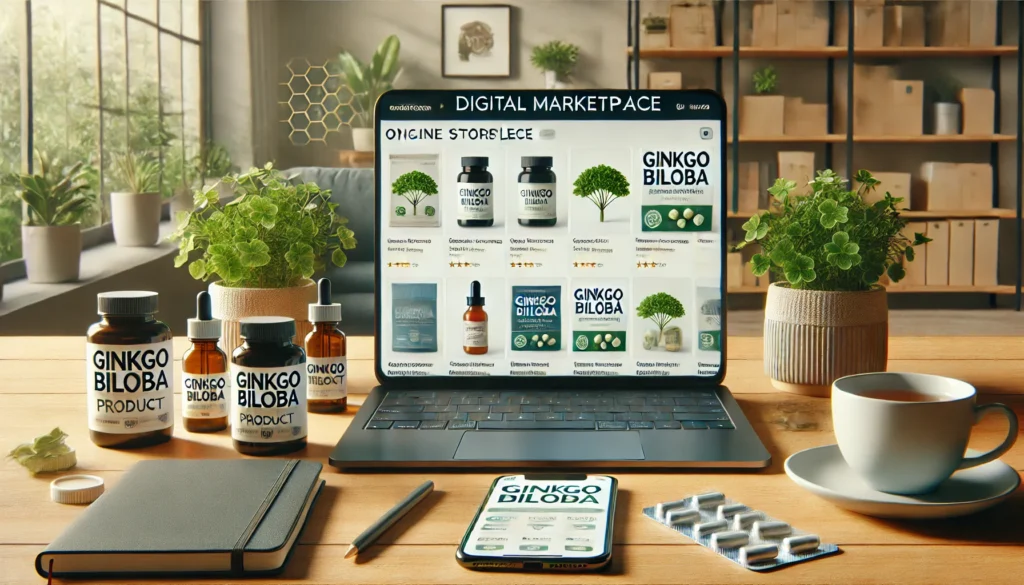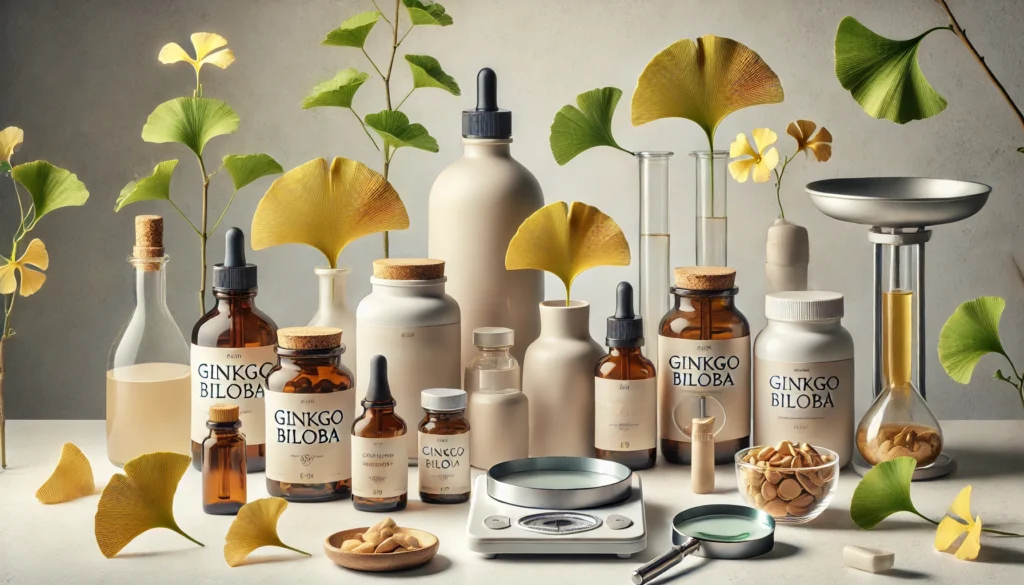In a world where natural health solutions are increasingly embraced by those seeking holistic wellness, Ginkgo biloba has emerged as a staple in cognitive enhancement and mental clarity. For many, the search for a reliable source of this ancient botanical is not merely about convenience but also about safety, efficacy, and affordability. As a revered nootropic known for its potential to support memory, focus, and circulation, Ginkgo biloba continues to attract attention from health-conscious consumers and creative thinkers alike. But with such growing demand comes an overwhelming marketplace, prompting essential questions: where to buy Ginkgo biloba, how to identify quality products, and how to ensure you’re paying the right price for optimal benefit.
You may also like: Ginkgo Biloba Benefits for Creative Thinking: How This Ancient Herb Supports Cognitive Clarity and Focus
Understanding the importance of these concerns, this comprehensive guide delves into the science, sourcing, and smart shopping strategies surrounding Ginkgo biloba. It is designed for a college-educated audience that values not only the health benefits of natural ingredients but also the integrity of the products they choose to consume. With an emphasis on evidence-based information, ethical considerations, and practical buying advice, this article offers everything you need to make an informed Ginkgo biloba purchase—whether you’re just beginning your supplement journey or refining an existing wellness routine.
Why Quality Matters When Buying Ginkgo Biloba Products
Ginkgo biloba supplements may seem ubiquitous in the natural products aisle, but their quality can vary dramatically depending on sourcing, formulation, and manufacturing practices. At its core, Ginkgo biloba’s effectiveness hinges on the precise concentration of active compounds—primarily flavonoids and terpenoids—that must be standardized for consistent results. Subpar products may contain insufficient levels of these compounds, rendering the supplement far less effective than its label suggests.
Moreover, low-quality Ginkgo biloba supplements can sometimes be contaminated with fillers, adulterants, or even other plant materials altogether. Such impurities not only compromise the health benefits but also pose potential safety concerns. This makes understanding where to buy Ginkgo biloba—especially from reputable vendors—a critical part of the consumer decision-making process.
To identify high-quality Ginkgo biloba products, it’s essential to look for third-party testing, transparency in ingredient sourcing, and compliance with Good Manufacturing Practices (GMP). Certifications from organizations such as NSF International, USP, or ConsumerLab offer further assurance that the supplement meets established safety and efficacy standards. Understanding what is the best Ginkgo biloba to buy means considering not just potency, but purity, traceability, and reputation.

Navigating the Ginkgo Biloba Marketplace: Online vs. In-Store
As you contemplate where to get Ginkgo biloba, one of the most immediate decisions involves choosing between online retailers and brick-and-mortar stores. Each option presents its own set of advantages and challenges, depending on your needs and priorities.
Online platforms offer a vast array of ginkgo products with detailed reviews, ingredient breakdowns, and often lower prices due to fewer overhead costs. For those seeking a cheap Ginkgo biloba supplement without sacrificing quality, well-reviewed online sources can provide excellent value. Sites like iHerb, Amazon, and specialty nootropic retailers often carry products backed by customer testimonials and third-party lab testing reports. Additionally, subscription-based services may offer discounts for recurring orders, which can be advantageous for long-term users.
On the other hand, buying Ginkgo biloba in-store—at places like health food shops, pharmacies, or vitamin retailers—provides the benefit of immediate access and the ability to physically inspect the packaging. Some consumers feel more confident speaking directly with knowledgeable staff who can answer questions about specific brands. While in-store prices may be slightly higher, the tactile experience and professional guidance can justify the cost for those new to supplements.
Ultimately, the decision on where to buy Ginkgo biloba often comes down to your comfort level, budget, and how much personal research you’re willing to do. Whether online or in-person, the key is to ensure that the brand you choose maintains high standards and positive consumer feedback.
Recognizing Red Flags: What to Avoid When Shopping for Ginkgo Biloba
In the increasingly crowded market of Ginkgo biloba products, it’s not uncommon to encounter brands that prioritize profit over quality. Recognizing these red flags is critical when considering where to find Ginkgo biloba that is both safe and effective. A lack of transparency in sourcing, missing certificates of analysis, vague dosage information, and exaggerated health claims should all raise suspicion.
One significant issue is the mislabeling of extract concentrations. For a supplement to be effective, it should typically contain 24% flavone glycosides and 6% terpene lactones—the concentrations used in most clinical studies. However, many products on the market fail to meet this standard, which compromises their efficacy. In such cases, a cheap Ginkgo biloba supplement might not be a bargain at all but rather a wasted investment.
Another concern is the presence of unlisted additives or harmful contaminants such as heavy metals or pesticides. Reputable companies disclose full ingredient lists and undergo third-party testing, which should be clearly displayed on their websites or packaging. A product that is suspiciously inexpensive, lacks this documentation, or uses vague language like “natural blend” without further explanation should be approached with caution.
Knowing where can you buy Ginkgo biloba safely means being vigilant, reading labels, and avoiding brands that make unrealistic promises like “instant brainpower” or “cure for dementia.” Genuine supplements will present their benefits honestly and focus on supporting cognitive health rather than offering miracle cures.
Comparing Ginkgo Biloba Price Points Across Different Retailers
Pricing is often one of the most influential factors when choosing where to get Ginkgo biloba, but it’s important to understand that value goes beyond the sticker price. While it’s tempting to gravitate toward the cheapest option, evaluating cost in relation to quality, standardization, and dosage is a more meaningful approach.
Retailers such as Costco or Walmart may offer budget-friendly options that appeal to price-conscious consumers. These may work well for individuals seeking a basic supplement for general wellness. However, premium brands sold through specialized nootropics sites or integrative health stores often include added features like enhanced bioavailability or combination formulas with synergistic ingredients such as Bacopa monnieri or phosphatidylserine.
When comparing prices, be sure to calculate the cost per effective dose. A bottle that seems inexpensive but requires three capsules per serving may end up costing more in the long run than a higher-priced product with better bioavailability and once-daily dosing. This is especially relevant when evaluating where can I get Ginkgo biloba that aligns with both your financial and health goals.
Subscription services and bulk purchasing options can also influence the price. Some companies offer savings of 10%–20% on recurring shipments, while others provide free shipping or bundle deals that include other cognitive enhancers. In each case, it’s essential to verify that lower prices don’t come at the cost of reduced quality or compromised safety.

Frequently Asked Questions About Buying Ginkgo Biloba Products
1. How do seasonal trends affect Ginkgo biloba price and availability?
Ginkgo biloba products may be subject to seasonal fluctuations in both price and availability due to agricultural cycles, harvesting periods, and supply chain dynamics. For example, since Ginkgo biloba is typically harvested in late fall, some fresh extract batches tend to hit the market in early winter, leading to promotional pricing and limited-time discounts. Conversely, during late spring and early summer, demand often rises as consumers seek natural cognitive support during high-stress seasons like exam periods or business planning quarters. These surges in demand can influence the ginkgo biloba price, especially among popular brands or specialized formulas. If you’re trying to figure out where to get Ginkgo biloba at the best price, monitoring seasonal deals from trusted retailers may yield savings without compromising product quality.
2. What should I know about international regulations before making a Ginkgo biloba purchase from overseas?
Purchasing Ginkgo biloba from international retailers can be cost-effective, but buyers must be cautious about regulatory differences. In some countries, Ginkgo biloba is classified as a prescription medication, while in others it’s available as an over-the-counter supplement. These classifications impact product formulation and labeling, which can be confusing to untrained consumers. When deciding where to buy Ginkgo biloba globally, look for retailers who comply with your home country’s import laws and prioritize brands that adhere to international GMP standards. Always verify ingredient concentrations and ensure that customs regulations allow the shipment of Ginkgo biloba products to your location.
3. Are there any digital tools that can help compare Ginkgo biloba products across retailers?
Yes, several digital platforms and browser extensions can help compare prices, ingredient profiles, and consumer reviews across a variety of supplement vendors. Websites like Labdoor, SupplementReviews, and ConsumerLab provide independent testing and detailed breakdowns of ingredient quality, absorption rates, and label accuracy. These tools can help you determine what is the best Ginkgo biloba to buy based on your individual health needs and budget. In addition, price comparison engines and subscription-tracking apps like Honey or CamelCamelCamel are useful for those looking to make a cheap Ginkgo biloba supplement purchase without sacrificing quality. These platforms often alert users when prices drop on major sites, helping them identify where can you buy Ginkgo biloba at a discount.
4. How do sustainability and ethical sourcing affect Ginkgo biloba products?
Sustainability is becoming a significant factor in how companies produce and market Ginkgo biloba supplements. Ethical harvesting practices, eco-friendly packaging, and fair labor conditions can all influence consumer perception and trust. Some brands even provide full traceability reports showing where their ginkgo leaves were sourced and how they were processed. If you’re researching where to find Ginkgo biloba that aligns with both your health and environmental values, look for certifications from organizations like FairWild or Ecocert. These labels indicate a commitment to biodiversity, sustainability, and social responsibility—attributes that are often overlooked when assessing a Ginkgo biloba purchase.
5. Can you find quality Ginkgo products in local farmers’ markets or herbal apothecaries?
While less common than online or pharmacy options, some high-quality ginkgo products can be found at farmers’ markets or local herbal apothecaries, especially in regions with a strong tradition of herbal medicine. These vendors often offer artisanal or small-batch preparations, such as tinctures or dried leaves for tea, that may appeal to more traditional or DIY-inclined consumers. When considering where can I get Ginkgo biloba locally, always inquire about sourcing methods, extraction techniques, and third-party testing. These products may lack standardized concentrations, so understanding dosage and potency becomes even more important. That said, shopping locally can sometimes provide fresher or more unique formulations than mass-market supplements.
6. Are combination supplements with Ginkgo biloba as effective as standalone products?
Combination supplements often pair Ginkgo biloba with other nootropics like Bacopa monnieri, Rhodiola rosea, or phosphatidylserine to enhance cognitive effects. While these blends can offer synergistic benefits, they can also make it harder to isolate which ingredient is delivering results—or causing side effects. If you’re making a Ginkgo biloba purchase as part of a larger cognitive enhancement plan, carefully review the ratios of each component. Understanding where to buy Ginkgo biloba as a single-ingredient product versus a blend allows you to better track your body’s response and avoid unnecessary compounds. Some users opt to first try standalone ginkgo products before layering other ingredients for a customized stack.
7. How does Ginkgo biloba quality vary between capsule, liquid, and powder forms?
Ginkgo biloba products come in a variety of forms, and the delivery method can affect both absorption and effectiveness. Capsules and tablets are the most common and convenient, but liquid tinctures often offer faster absorption through sublingual delivery. Powders can be mixed into smoothies or teas but may degrade more quickly when exposed to air or moisture. If you’re wondering where to get Ginkgo in the most effective format, consider your lifestyle, dosage preferences, and any gastrointestinal sensitivities. Some consumers who experience digestive discomfort with capsules may find that liquids or teas offer a gentler alternative.
8. What role do independent herbalists play in the Ginkgo biloba market?
Independent herbalists often act as educators, formulators, and ethical advocates within the botanical supplement world. Many create personalized Ginkgo biloba products tailored to a client’s unique cognitive, circulatory, or emotional needs. These bespoke blends are usually based on comprehensive intake forms and consultations, offering a highly individualized alternative to one-size-fits-all capsules. If you’re exploring where can you buy Ginkgo biloba that supports a more holistic or integrative approach, seeking out an experienced herbalist may provide added value. Just ensure the practitioner is certified and operates in accordance with regional health authority guidelines.
9. How can I avoid counterfeit or expired Ginkgo biloba supplements online?
Counterfeit or expired Ginkgo biloba products can be surprisingly prevalent on unverified platforms or marketplace resellers. These products often have inconsistent labeling, poor packaging integrity, or missing batch codes. When deciding where to buy Ginkgo biloba online, always prioritize official brand websites or verified sellers with transparent return policies and robust customer service. Cross-check expiration dates and verify that the product has not been reformulated without notice. Tools like barcode scanners or product authentication apps can also help confirm whether the Ginkgo biloba supplement you’ve received is legitimate.
10. What should I do if a Ginkgo supplement seems to stop working over time?
It’s not uncommon for some users to feel diminishing effects from Ginkgo biloba after extended use, a phenomenon often referred to as supplement tolerance. In such cases, cycling off the supplement for a few weeks or switching brands may help reset sensitivity. Another approach is to reassess the product’s potency or formulation—sometimes the issue lies in a change in the product rather than your body. When evaluating where to find Ginkgo biloba that continues to meet your cognitive needs, look for brands with consistent third-party testing across batches. You might also explore advanced formulations or synergistic pairings to reignite effectiveness without increasing dosage.

What Is the Best Ginkgo Biloba to Buy? Evaluating Top-Rated Brands
Determining what is the best Ginkgo biloba to buy depends on several factors, including your individual health goals, dosage preferences, and ingredient sensitivities. However, some brands consistently earn high marks for quality, transparency, and effectiveness based on both clinical validation and user satisfaction.
Companies like Nature’s Way, Life Extension, and Pure Encapsulations have built reputations for producing well-researched, third-party-tested ginkgo products. These brands typically offer standardized extracts with clinically validated dosages and clear labeling. For instance, Nature’s Way Ginkgold contains patented extract formulations that align closely with those used in medical studies, while Life Extension’s Neuro-Mag series integrates Ginkgo biloba with magnesium threonate for enhanced cognitive support.
On the more affordable end, brands like NOW Foods and Doctor’s Best deliver reliable products at lower price points without compromising essential quality metrics. These can be ideal for consumers seeking a cheap Ginkgo biloba supplement that still meets basic efficacy standards. However, it’s important to double-check that these products include appropriate extract concentrations and have supporting documentation for purity.
Whether you’re looking for a premium formula or a more budget-friendly option, knowing where can I buy Ginkgo that reflects these priorities means aligning your values with a brand’s practices. It also means reading reviews critically, verifying certifications, and checking that the company offers customer support in case of concerns or questions.
Further Reading:
Ginkgo (Ginkgo Biloba) Supplements Review
INLIFE Ginkgo Biloba Capsule 60’s
Vitagreen Ginkgo Biloba Capsule
natural brain supplements, herbal cognitive enhancers, best nootropics for focus, memory support herbs, herbal brain boosters, cognitive health supplements, ginkgo extract benefits, ginkgo leaf uses, improve mental clarity naturally, plant-based nootropics, smart supplements for adults, natural remedies for brain fog, attention and focus herbs, alternative medicine for memory, brain circulation support, longevity herbs for the brain, herbal supplements for creative thinking, adaptogenic herbs for cognition, mind-enhancing botanicals, holistic brain health solutions
Important Note: The information contained in this article is for general informational purposes only, and should not be construed as health or medical advice, nor is it intended to diagnose, prevent, treat, or cure any disease or health condition. Before embarking on any diet, fitness regimen, or program of nutritional supplementation, it is advisable to consult your healthcare professional in order to determine its safety and probable efficacy in terms of your individual state of health.
Regarding Nutritional Supplements Or Other Non-Prescription Health Products: If any nutritional supplements or other non-prescription health products are mentioned in the foregoing article, any claims or statements made about them have not been evaluated by the U.S. Food and Drug Administration, and such nutritional supplements or other health products are not intended to diagnose, treat, cure, or prevent any disease.


